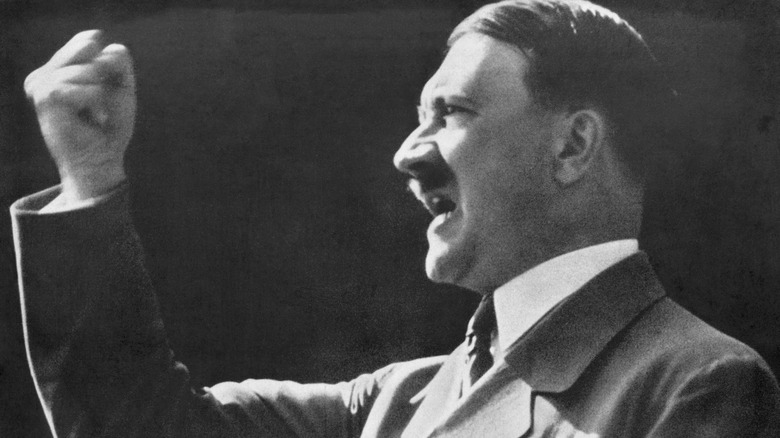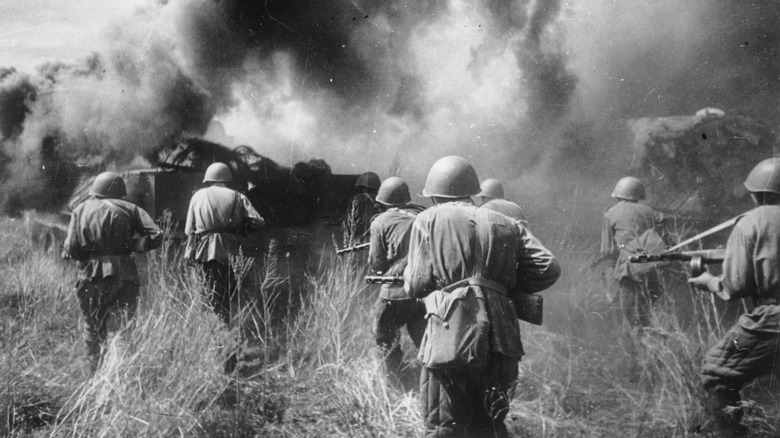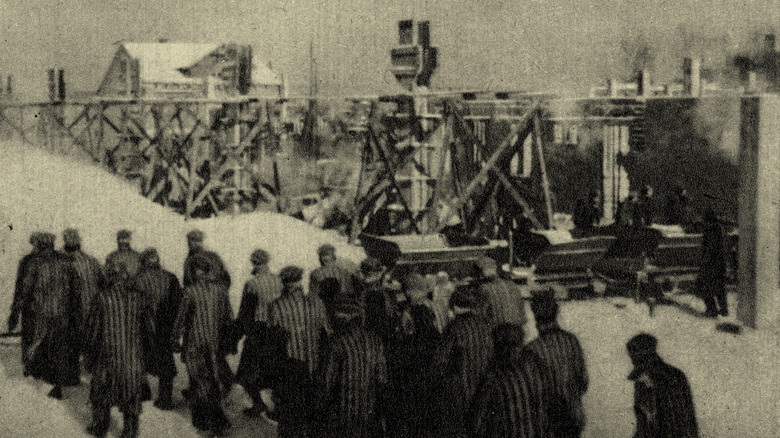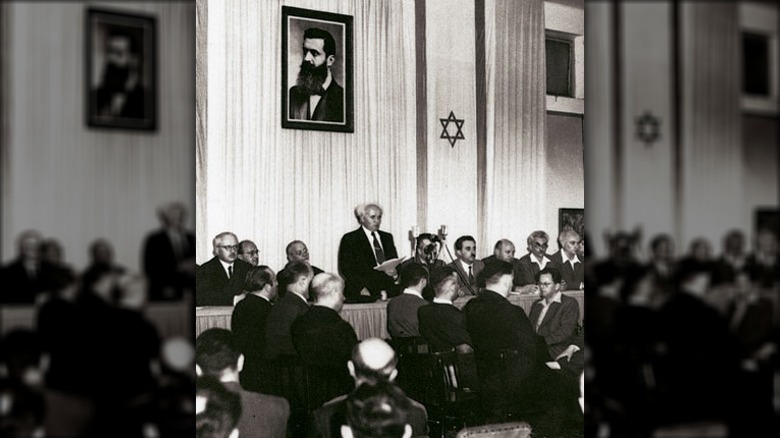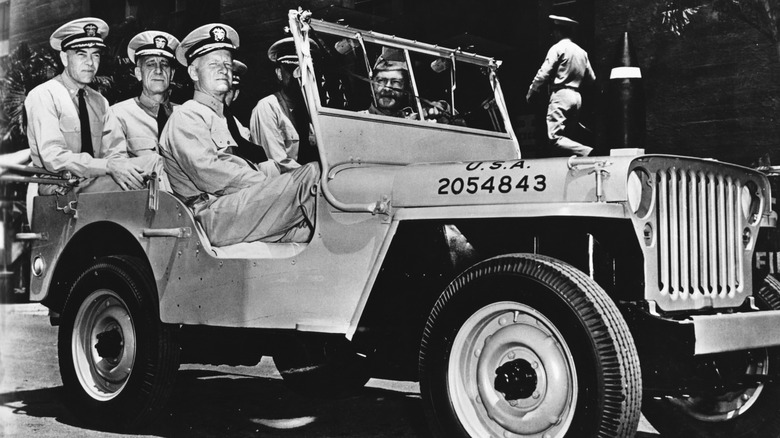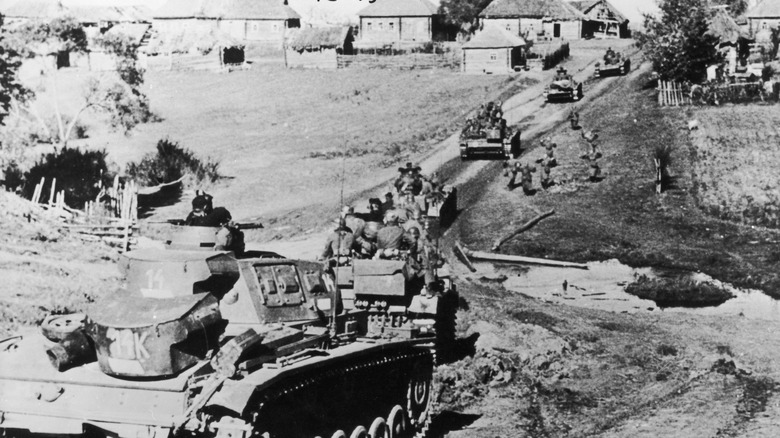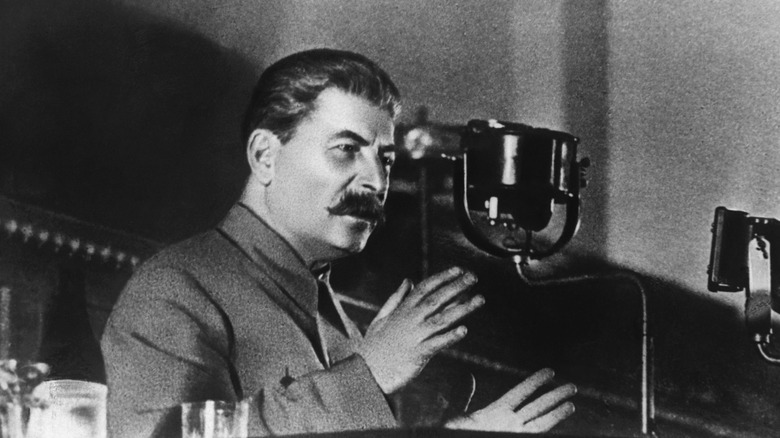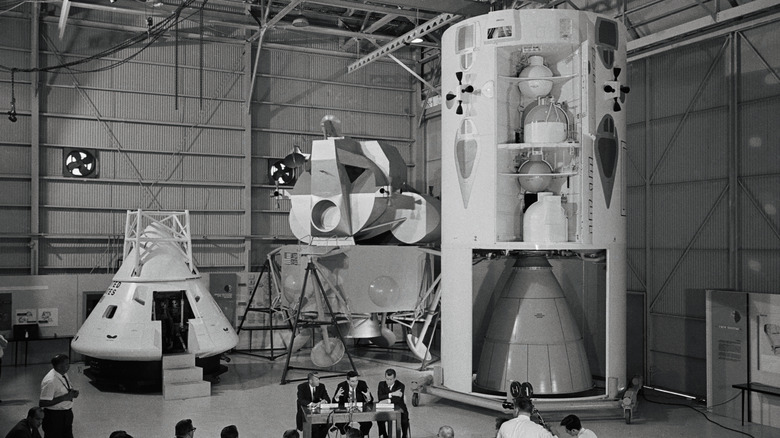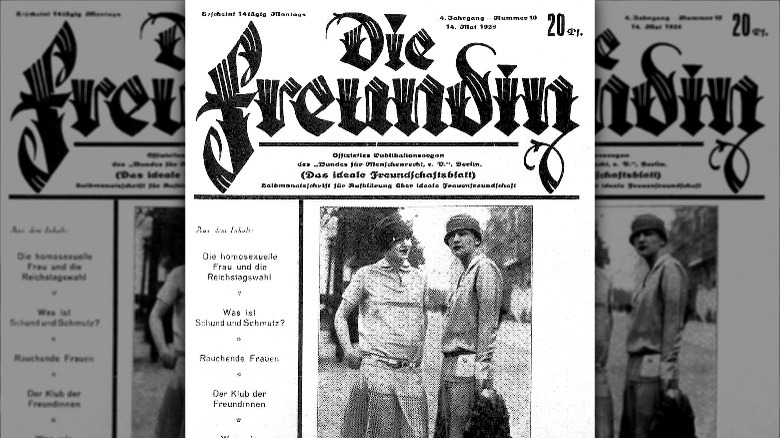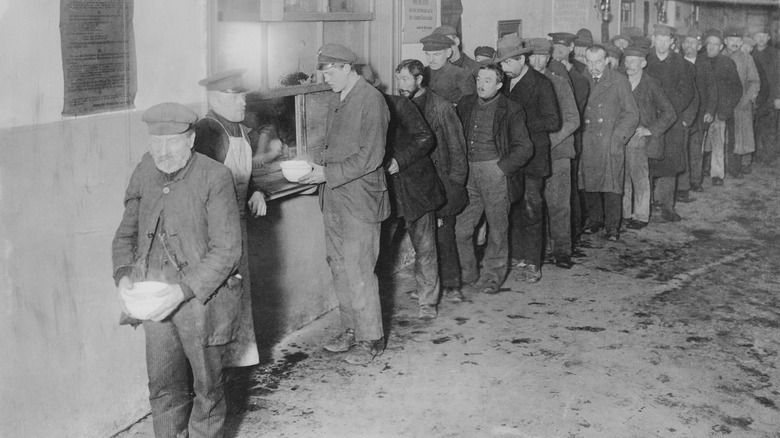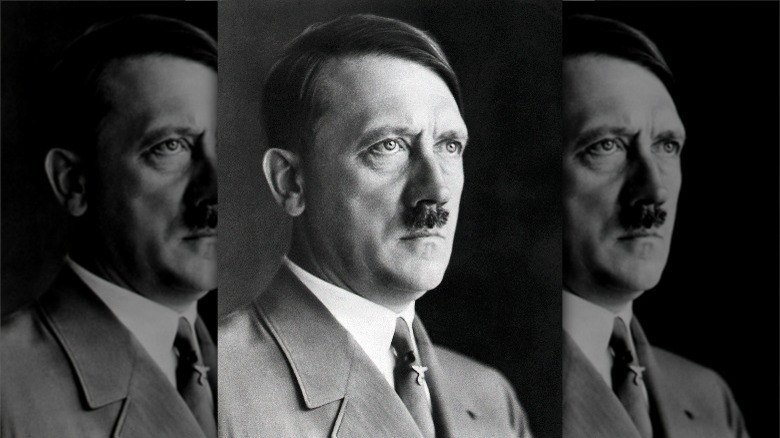Is This What The World Would Look Like If Hitler Never Existed?
It's pretty hard to deny the appeal of speculative history. Seriously, who hasn't tried to think about the "what ifs" of the past? If one small event was changed, would that even have any effect on the present? Or, alternatively, if one huge thing went a different way, then just how much damage would that do to the modern day? Would anything even be recognizable?
World War II is quite the fertile ground for indulging an impressive number of those thought experiments. Major pieces of media have already taken a look at what might have happened had the Nazis won the war — "The Man in the High Castle," anyone? The overall trajectory of the war isn't the only subject of these sorts of questions, though, and there's one infamous figure that many people like exploring through the lens of hypothetical situations: Adolf Hitler. And many of those hypotheticals are variants of the same general idea: What would the world have been without Adolf Hitler coming to power in Germany?
Of course, speculative history is, well, speculative by nature, so there's no real way of knowing exactly what the present might look like had Hitler never been around (unless someone manages to invent time travel and has little regard for the Butterfly Effect). In other words, feel free to take things with a grain of salt, but here are some potential outcomes of Hitler never existing.
Would World War II have even happened?
If you're taking a look at a speculative history in which Adolf Hitler never existed, then this is a pretty reasonable first question to approach. After all, World War II and the Holocaust are the things most associated with Hitler.
That said, the question of whether or not World War II would have come to pass without him is fairly complicated. On one hand, there's definitely an argument to be had that there were enough external factors to lead a hyper-conservative faction to come to power in Germany circa the 1930s. But there's also an argument that Hitler was fairly central to the rise of the Nazi party. Prior to his appointment as chancellor, the Nazis weren't actually that popular, so Hitler getting that position was, in part, a result of his own machinations. In other words, without Hitler, there might have never been an ascendant Nazi party or Second World War (at least, at that exact time and under the same circumstances).
But it's not just the European front that might have been stymied. For context, World War II technically started in 1937 (rather than 1939) in Asia, owing to Japan's invasion of China. Even if that stayed the same, though, everything to follow is another question. Part of the eventual calculus of Japan's military strategy was based on the power struggles in Europe. But without a hyper-militaristic Germany, Japan might have limited the scope of its ambitions to only Asia, which subsequently might have also stopped the U.S. from ultimately intervening.
What if there had been no Final Solution?
If there's one thing that's heavily associated with the Holocaust, it's probably the term "The Final Solution." In case you're not aware, this refers to the final and most deadly stage of the Holocaust, beginning in 1941 and lasting until the end of World War II, during which time most deaths within the Jewish population occurred. The Nazi regime wanted to kill 11 million Jews by the war's end. They didn't quite get there, but 6 million deaths is still horrific.
So then if Adolf Hitler wasn't around — and working on the assumption that the Holocaust would never have happened — what might the Jewish population look like today? Researcher Sergio Della Pergola has done the historical number crunching, explaining (via Haaretz) that, prior to the Holocaust, there were about eight Jewish people per thousand worldwide; as of 2009, there were only two per thousand. If you want even more stats, Pergola has also estimated that, if not for the Holocaust, the worldwide Jewish population would be some 32 million, compared to the 13 million that it actually is today. Pergola has explained the discrepancy by saying that the Holocaust wasn't just a one-time instance of destruction — it destroyed an entire generation of people, many of whom were pretty young. And that has ripple effects. All of those people ceased to exist, but, in a way, so did all of their descendants. Effectively, the Holocaust didn't just wipe out one generation, but multiple, and the worldwide Jewish population has yet to fully recover.
Israel may have never come into existence
To be entirely clear, there's no understating the horrors of the Holocaust. That said, there have been academic discussions surrounding some surprising ways the Holocaust may have impacted history: namely, the establishment of the state of Israel.
In real history, there was a decent amount of resistance to the creation of a Jewish state out of the then-British colony of Palestine, largely due to Western nations hoping to keep good relations with Arabic communities. After World War II and the Holocaust, however, those views changed, and there was more international support for the creation of Israel.
But if Adolf Hitler never existed, the situation could have been quite different. Dr. Jeffrey S. Gurock has posited that even if the Holocaust had occurred but claimed fewer lives, Jewish communities in America might have never embraced Zionism, the movement to create a Jewish state (via The Times of Israel). Accordingly, the American government might not have supported the creation of Israel — or would have, at least, felt less strongly about the matter — likely leading to weaker diplomatic ties between the two nations. Dr. Shalom Salomon Wald has made similar claims, going so far as to say that, in a hypothetical situation like this, Israel might never exist at all. There would have been far fewer displaced Jewish people needing a home, and Zionists wouldn't have been the majority voice in the Jewish population.
Technology might look very different
As terrible as war is, there's often an odd byproduct that can come from large-scale conflict: innovation. Making things better, faster, more efficient, or even more deadly — those are needs that often arise thanks to the demands of war, and World War II was no different. But under the assumption of no Adolf Hitler and possibly no conflict, then what technology wouldn't exist without World War II?
Well, for one, there are plenty of things nowadays that are considered nice little consumer products but which actually have their origins in World War II military designs. Duct tape, for example, was originally designed to keep soldiers' equipment dry in the rain. Super glue came out of research for gun sights. Toys like the Slinky and Silly Putty were accidental products of wartime science. The old, reliable Jeep was even born from the military's desire for a durable vehicle. Synthetic rubber — the kind that's everywhere today and produced from petroleum — wouldn't have been invented without wartime politics cutting off American access to natural rubber sources.
Then, of course, there are the more obvious military advancements. The nuclear bomb and all of the research carried out by the Manhattan Project stands out; would nuclear technology (like power plants, sure, but even including certain cancer treatments) be anywhere near what it is today? And the Germans were responsible for more than a few advancements in military technology, creating the first fighter jets and plenty of ballistic missiles.
The Soviet Union might have dodged devastation
The trajectory of World War II seems simple — Nazi Germany, the Holocaust, Normandy, and victory on the Western front, good triumphing over evil. But there's considerably more to the story, such as the Soviet side of things.
For context, the Soviet Union was already in Nazi Germany's crosshairs, owing to the concept of "lebensraum" (German for "living space," and a parallel to America's Manifest Destiny). Granted, the idea existed before World War I, but Adolf Hitler made it a central point of Nazi doctrine, calling for not only the extermination of Jewish communities, but also the acquisition of Soviet lands. Nazi Germany and Soviet Russia did enter into a nonaggression pact in 1939, but Hitler chose to break that pact just two years later; what followed for the Soviets were some of the deadliest battles of World War II, to which Germany committed most of its military assets. The western parts of Russia were effectively razed to the ground, veritable ghost towns by 1945. Some 11 million Soviet soldiers died in the war, along with around 15 million civilians, a statistic that has no real comparison on the Western front (though it should be noted that Joseph Stalin's purges are included in those numbers).
But had Hitler not been around, would any of that have happened? Maybe the Soviet Union would have been less of a target for German aggression, or the nonaggression pact might have stood for longer. (Stalin did seem keen on negotiating with Germany.) Either way, the results might have been less bloody.
The Cold War might have turned hot
To be entirely fair, this particular possibility might be something of a misnomer in that, without Adolf Hitler, there just might have never been a Cold War. Or, if nothing else, it might have started rather differently.
While it's very easy today to see Hitler as the biggest threat of the 1930s, contemporary accounts held a very different view. Rather, a lot of Western nations feared Joseph Stalin and the Soviet Union more than they feared Hitler and Nazi Germany, even as late as 1938. According to the BBC, people would even claim, "Better Hitlerism than Communism," and actually saw Hitler's rise as a potential positive, protecting the rest of Europe from Soviet invasion. And those fears weren't entirely unfounded. Secret protocols in the German-Soviet Nonaggression Pact seemingly proved that the Soviets did have imperialist motives. The two countries had essentially divided eastern Europe between them, and up until the breaking of that pact, the Soviet Union was busy annexing neighboring countries.
So that raises the question: Without Hitler, what would the Soviets have done? Some speculation posits that Stalin would have taken advantage, attacking and annexing even more of Europe, eventually forcing direct military confrontation between the Soviet Union and the U.S. Other theories claim that Stalin would never have picked a direct fight with the U.S or western Europe, but the extant fears surrounding communism would have just forced the world toward the Cold War even earlier.
NASA might not be what it is today
Admittedly, this one might sound a little far-fetched; after all, what relation would Adolf Hitler have with NASA? Well, that would be a U.S. incentive known as Operation Paperclip. There's a whole host of sketchy historical facts, but here's the CliffNotes version: Operation Paperclip happened to give scientists — known and active Nazis, specifically — jobs in the U.S. The military effectively covered up the war crimes committed by Nazi scientists in order to poach their abilities — just one of many messed up things regarding the Cold War.
And one of the American organizations to benefit the most from this? NASA. Say what you will about the Nazis, but they were ahead of the curve when it came to rocket technology. The U.S. recognized that, and, by recruiting those Nazi scientists (rather than, say, prosecuting them), they were able to put them to work on space exploration. To great effect, it should also be said — moral quandaries aside, at least. Seriously, the first director of the Kennedy Space Center, Dr. Kurt Debus, who oversaw the Saturn and Apollo programs? A former Nazi. The former director of the Marshall Space Flight Center, NASA's strategic planner, and "Father of American Rocketry" (per History Collection), Wernher Von Braun? Also an ex-Nazi. And they were far from the only ones engaged with NASA's research.
Had Hitler not been around, who's to say whether or not the circumstances leading to Operation Paperclip would have happened? And, in turn, would NASA ever have become the organization it is today?
LGBTQ+ culture in Berlin
Discussions of Germany's Weimar Republic — the government that existed between the old monarchy of World War I and the rise of Nazi Germany — can get pretty complicated. Politically, it faced a lot of problems, but it's worth noting that contemporary Berlin was something of a cultural marvel.
Notably, 1920s Berlin displayed an incredible level of acceptance toward LGBTQ+ communities, making it one of the most liberal places in the world at the time. Despite homosexuality technically being illegal, the law just wasn't heavily enforced in Berlin, and dozens of gay and lesbian bars were allowed to operate openly throughout the city. Fledgling gay rights movements sprung up, LGBTQ+ publications were distributed in spades, transgender folks were recognized and accepted, cross-dressing became socially acceptable (at least, to some degree) — Berlin just became something of a safe haven where queer culture could flourish. But when the Nazis rose to power, they brought with them the incredibly conservative idea that homosexuality was a plague to be eliminated, something unnatural that threatened the purity of the Aryan race. Accordingly, those laws against homosexuality became much harsher and more strictly enforced in the 1930s — the norm until the late 1960s.
Had Adolf Hitler never seized power and spread Nazi doctrine, though, maybe Berlin would never have been subjected to these strict laws. And if queer culture had continued to flourish in a major urban center, maybe more people would even recognize 1920s Berlin as the start of the modern gay rights movement — a distinction now typically given to the Stonewall Uprising.
Things might not have gone too differently, politically speaking
The idea of relatively little changing across history as a result of removing Adolf Hitler from the timeline — admittedly, that's not exciting. After all, Hitler was one of the big bads of the 20th century, so shouldn't his nonexistence change a lot?
While, yes, that's a totally understandable argument, it's also hard to ignore the fact that Hitler himself didn't make World War II happen. Rather, his rise to power was tied to pre-existing problems and ideologies. Messed-up events of World War I and the Treaty of Versailles left Germany's economy in ruins and its people humiliated. Not only was it a military loss, but they were also forced to give up territories and pay $33 billion in reparation payments; the latter led to catastrophic inflation, with 4 billion German marks equalling one American dollar in 1923, (something for which Allied officials felt little pity). The Great Depression and rise of communism only led to further chaos, leaving the people looking for hope, guidance, or just someone to blame; Hitler was in the right place at the right time to provide that. It's even possible to say that the Holocaust might have happened, regardless of Hitler's existence; antisemitism was at the core of Nazi ideology, but it's been around in one form or another since antiquity.
In other words, the ideas and circumstances underlying the Third Reich weren't unique creations of Hitler. Another dictator could've come along and benefitted from the same situation, potentially even spouting similar ideology.
History might be impossible to change
Ostensibly, the discussion of what the world might look like without Adolf Hitler seems like it would be a historical one. You know, simple cause and effect — the ripples that form from one of history's greatest dictators never rising to power. But there might also be something to be had by looking to the scientists out there.
See, the question of Hitler never existing often bleeds into discussions of time travel, and wrapped up in those discussions is something called the Novikov Self-Consistency Principle — essentially the idea that paradoxes cannot exist. In other words, for the purpose of this thought experiment, history is basically immutable; it can't really be changed. So if you were to alter this question ever so slightly, looking at what would happen if, say, a time traveler tried to kill Hitler before he ever had a chance to become a dictator, then the prospect of self-consistency can come into play.
Speculative histories that abide by this idea posit that even if an infant Hitler were killed, then a different individual would come to fill that exact same role; Hitler's mother might just adopt another child and name him Adolf, for example. Or, alternatively, an attempted assassination might actually be the thing that put Hitler on the road to becoming a dictator, feeding into the ideologies that came to characterize the Nazi party. Basically, nothing would change; at most, history would work to self-correct, in the long run.
